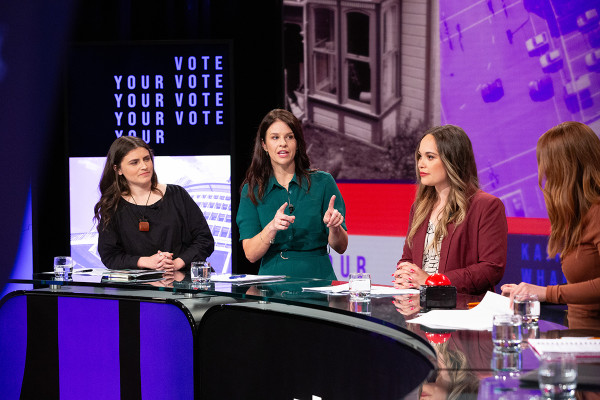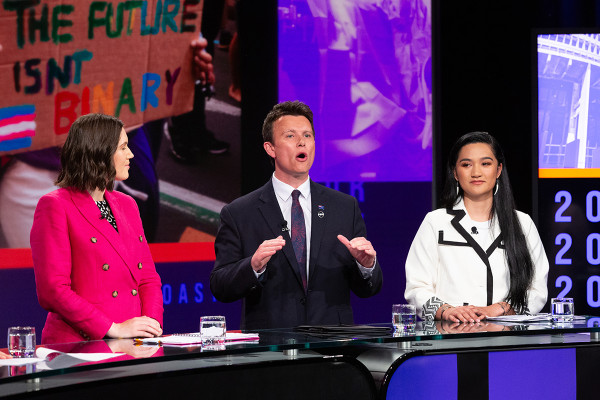By Anna Murray
Content warning: This article discusses transphobia.
Analysis: Six political parties got to pitch for the youth vote at the TVNZ Young Voters' Debate last night — and the young studio audience had some clear feelings about what they had to say, 1News' Anna Murray writes.
Where were you when Lee Donoghue, former Shortland Street star and current New Zealand First candidate, revealed he was once struck by lightning at an Iron Maiden show in Rome?
Me?
I was in the studio audience at the TVNZ Young Voters' Debate, where Donoghue's lightning story proved to be just one stop in a rollercoaster exchange of political ideas.
The debate saw six young (or young-adjacent) election candidates share their parties' solutions to issues that mean the most to younger voters, including climate change, rainbow rights, housing, and — overwhelmingly — the cost of living.
The young voters that made up the studio audience last night had been told they could show their appreciation — or otherwise — to what each of the politicians were saying, and they were more than happy to oblige.
Minor parties, major moments
Overall, the audience reaction to the candidates from the two major parties — Labour's Arena Williams and National's Erica Stanford — was generally more muted, while the bigger emotions, both positive and negative, were saved for the candidates from the minor parties.
It seemed indicative of an election campaign where it's generally been less about what's happening with the two big parties and more about what their potential coalition partners are up to.

The Green Party's Chloe Swarbrick, National's Erica Stanford, and Labour's Arena Williams are seen at the TVNZ Young Voters' Debate (Source: 1News).
The cost of living was identified as the issue nearest and dearest to young voters' hearts and every candidate across the political spectrum at last night's debate agreed people were doing it tough right now.
Reactions to the parties' solutions to this issue spanned from general indifference to Labour's plans to remove GST off fruit and vegetables, to spluttered incredulity when Stanford talked about National's planned tax cuts and encouraged young people "to get that promotion and work more hours if they want to" so as to reach a new tax threshold.
There was a lot of head nodding when Te Pāti Māori candidate Hana Rāwhiti Maipi-Clarke labelled it a "cost of surviving" crisis for many.
Housing was also identified as a big issue for younger voters and debate around what to do for renters had audience members noticeably whispering amongst themselves last night.
Those mutterings switched to claps and cheers as the Greens' Chlöe Swarbrick spoke about the rent controls her party wants to introduce in the next government.
The angry whispers returned as ACT deputy leader Brooke van Velden defended her party's promise to penalise parents whose children don't go to school, coming hot on the heels of interviews with Tamaki College students describing how they can work up to 50 hours a week to help support their families.
I don't think anybody expected the comedy highlight of the debate to come during its section about climate change, but that it did after debate co-host Anna Harcourt asked the candidates if any of them were afraid of dying in an extreme weather event brought on by climate change.
NZ First candidate Lee Donoghue piped up that he wasn't, even though he had been hit by lightning once.
Another attack on bathrooms
Last night's audience saved some of its biggest reactions for Donoghue as his repeated references to "woke extremism" throughout the debate were elaborated on during a discussion around education.

ACT's Brooke van Velden, NZ First's Lee Donoghue, and Hana-Rāwhiti Maipi-Clarke of Te Pāti Māori (Source: 1News)
When prompted to speak about NZ First's transgender bathroom policy, Donoghue launched into claims that New Zealanders don't feel safe using toilets.
"We are not on another planet, people are concerned about this," he said. "We have people basically saying to us, 'Hey, I was assaulted in a bathroom by a biological male, this is wrong.'"
When asked for concrete evidence and statistics to back up his claims, Donoghue could not produce any.
To say his thoughts on the issue were not well received by several of the other candidates on set or those gathered in the studio audience would be an understatement.
It was left to Stanford, the National candidate and a potential NZ First coalition partner, to take some of the wind out of Donoghue's attack on woke "indoctrination" and echo her party leader's assertions that New Zealanders are not concerned about bathrooms.
She said the issue had not been raised by any of the schools she says she visits regularly as part of her education portfolio.
Donoghue was undeterred by mention of studies that show trans and non-binary teenagers face a higher risk of sexual assault in schools that prevent them from using bathrooms consistent with their gender identity.
Nor did he seem phased that the reaction from the young audience to his party's transgender bathroom policy ranged from loud ridicule to anger.
It's unlikely NZ First is trying to drum up the youth vote by attacking "woke extremism" or pushing transgender bathroom policies. Perhaps they figure those views will buy them support elsewhere in the voting population, among an age demographic more inclined to vote come polling day.
Because, historically, younger people have voted in lower numbers. Only around 64% of the population aged 18-24 are currently enrolled to vote on October 14.
And this is an issue that's clearly on the minds of the Green Party and Te Pāti Māori, with both party candidates using their last 15 seconds of air time to plead with young people to vote last night.
"We can't afford to be apolitical, whānau," said Maipi-Clarke.
Swarbrick shared a similar sentiment.
"Regardless of whether you engage in politics, politics engages with you," she said. "So, it's time for people to take back their power and to vote this election."
More stories:
People tell us the last time they went to the dentist
“If it was free, fucking oath, I’m there.”
Are we acting like we’re in a climate emergency?
The short answer is no.
Toilet politics: Trans people more likely to be victims, not perpetrators
“This fear-mongering is an absolute flipping over of what’s correct and who poses a threat to who.”